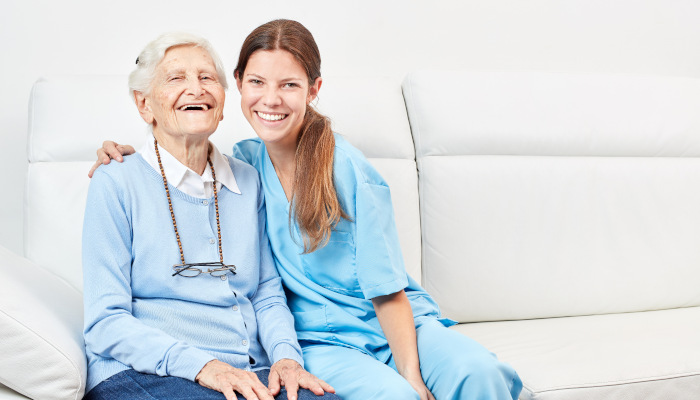We’ve all heard the saying “You never get a second chance to make a first impression”. Before you even speak a word, an opinion is already being formed, because more than 50% of a first impression is visual. Eye contact, a smile, body language, and overall hygiene play a large part in what others think about you. While it may seem vain, your appearance also plays a role in how you feel about yourself. Personal hygiene is far more than skin deep and greatly impacts our physical and mental health, so it must be taken seriously. It is vital that your senior loved one prioritizes their own hygiene, with assistance if needed.
Let’s discuss the importance of personal care and how to do a “head to toe” assessment to determine if you may need to intervene and assist your loved one. Here are a few things to consider, to make sure they’re on the right track; we will begin with the head, making sure they’re in the right mindset, and work our way down the body, ending with the feet.
Mental Health
Personal hygiene is extremely important to living a healthy life. Taking regular care of oneself not only improves your mental well-being, but it also helps to prevent a host of other health complications. Establishing a routine is the best way to ensure that personal hygiene needs are being met. Paying close attention to your loved one’s personal care can also help you navigate their feelings; if you notice they’re regularly neglecting personal hygiene, it can be a clear indication of depression.
Oral Care
Neglecting proper oral hygiene can not only be painful, but it can be expensive as well. For these reasons, it’s important to routinely brush, floss, and mouthwash every morning and evening. If your loved one wears dentures, they should remove and rinse them after eating, brush them daily, and soak them overnight. In addition to daily oral care, we must schedule regular dental cleanings and exams. Poor dental health can lead to tooth decay, gum disease, cavities, and other periodontal disease. Inflammation caused by periodontal disease can result in an increased risk of heart disease, according to the American Heart Association (AHA).
Skin Care & Body Odor
Regular showers or baths are a key element of good hygiene. Because seniors lead a more sedentary lifestyle, it is not necessary that they take a full bath every day, but this should be performed at least 3 times per week. Cleanliness helps to prevent both body odor and skin infections. This is especially important for seniors, as the body’s ability to repair the skin diminishes as we age. On days when a full bath is not needed, a warm washcloth to the feet, armpits, and genitals, along with a fresh change of clothes, is recommended. Additionally, applying lotion each day helps to keep the skin moisturized and well-hydrated.
Foot Care
Circulatory problems, diabetes, and arthritis are just a few of the concerns that may put seniors at a greater risk for foot-related aches and pains. For these reasons, it’s important that we take extra special care of our feet. Self-care, home health care, or a visit to the podiatrist are a few ways that we can prevent issues such as dry and cracked heels, ingrown toenails, or pressure sores. While these may seem like minor things, if left untreated, they can lead to infection or even amputation, especially in seniors.
Overall Appearance
A well-polished look, while not a necessity, can boost your senior’s self-esteem. Nicely tailored clothes coordinated shoes and accessories, and freshly combed and styled hair, can leave your loved one feeling confident, especially if they’re headed somewhere special. Sometimes a new tube of lipstick, a polished pair of shoes, or a pressed collared shirt is all that it takes to boost someone’s mood.
Now that we have a solid understanding of what to look for in our loved one’s personal hygiene, it’s important to help set them up for success and to ensure your senior is having the best day. This tried-and-true checklist will help to point you in the right direction.
- Establish a Routine: Repetition is key in putting a routine into place! Get each day off to a fresh start with a bath or a warm cloth “wipe-down”. From there, move your routine to the bathroom sink where your loved one can brush their teeth, wash their face, and fix their hair, before getting dressed. While your routine may not look exactly like this one, choose one that suits your individual needs and go from there.
- Safety-Proof the Bathroom: The majority of slip-and-fall accidents occur in the bathroom where water and slick surfaces make for a dangerous combination. Certain safety measures can be taken to help prevent or reduce the chances of a fall. Grab bars, non-slip grip, raised toilet seats, and shower chairs are all excellent modifications to help keep your seniors safe.
- Create a Comfortable Environment: Accepting help with everyday tasks can leave you feeling defeated; inviting someone into your most private and personal spaces can seem downright embarrassing and degrading. It is extremely important to be aware of and sensitive to these changes when assisting your loved one. Try to keep the atmosphere relaxing and the conversation natural, all while being mindful of their privacy. Allow your loved one to maintain as much independence as possible and assist only as needed.












